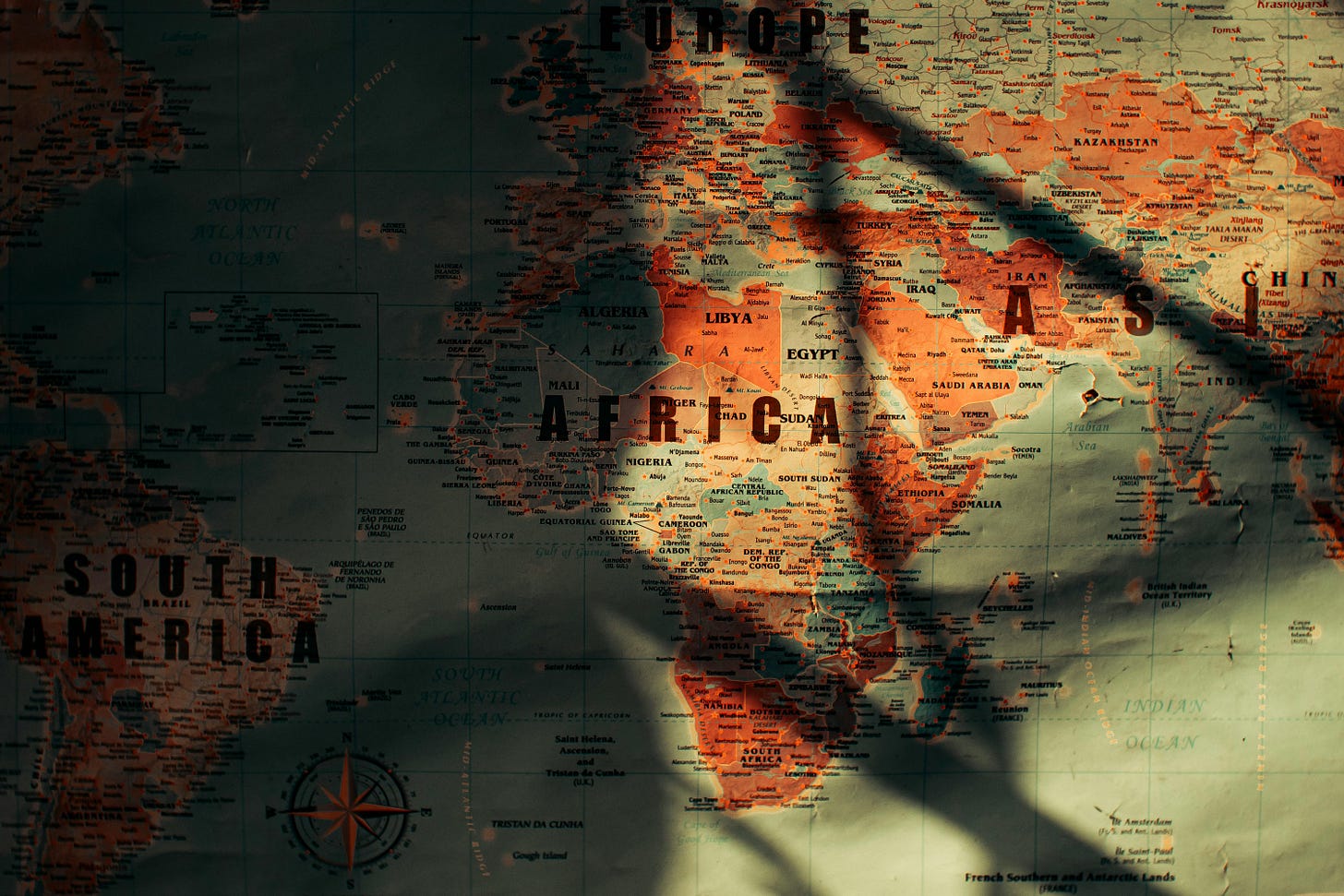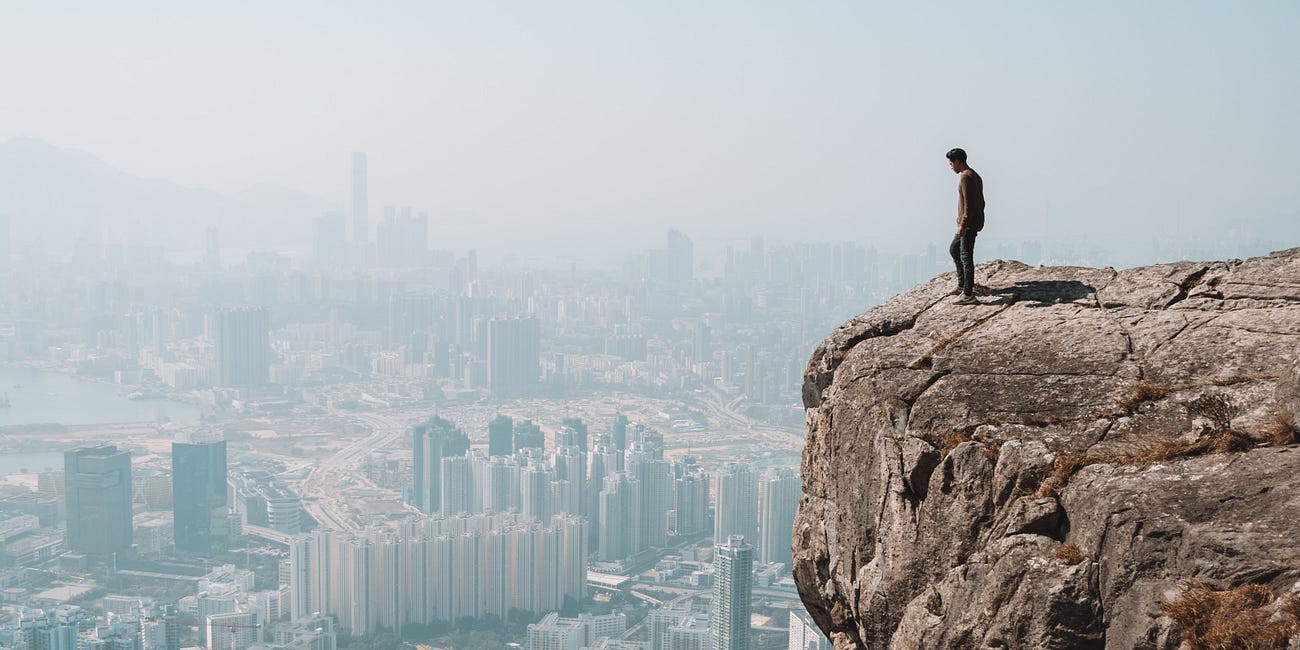On (Not) Justifying Air Travel in the Climate Emergency
A reflection on my ambivalence about flying, with wisdom from Dietrich Bonhoeffer, and praying for God's grace

Last week at this time I was offline and off-grid, ensconced in the wilderness of Algonquin Park. Today couldn’t be more different; I’m logged onto the airport wifi as I finalize a reflection on the ambivalence I’m feeling regarding flying in this time of climate crisis.
I’ve unlocked this essay for all subscribers, and invite each one of you to take some time to read it. Consider this your Friday Nudge!
We are in a climate and ecological crisis, and it’s all hands on deck... Subscribe to join a community of people of faith and like-minded people seeking to make change!
Want to support my work but not ready or able to subscribe yet? You can make a one-time contribution. Click here:
On (Not) Justifying Air Travel in a Climate Emergency
I’m writing from the Ottawa airport, waiting for the first leg of my journey to Nairobi, Kenya for work with the World Council of Churches and the World Communion of Reformed Churches. I will be the chaplain to the students of the 2024 Ecumenical Governance, Economics and Management (GEM) School for an Economy of Life. This is an annual joint initiative of the WCC and the WCRC, for church leaders from around the world. There will be 24 students for an immersive and intense time of prayerful learning. I’m honoured and thrilled to be joining them!
Economic justice and climate justice are inextricable; there will be much that I will learn from the participants and the leaders of the GEM School.
Yet, I’m filled with ambivalence.
I’ll be flying overseas, nearly 24,000 km (almost 15,000 miles) roundtrip in a climate crisis. Flying economy, I’m about to be responsible for emitting 4.585 metric tonnes (5.05 US tons) for this trip. (If I were flying first class, that amount would be 4-5 times higher).
Want to determine the carbon cost of that flight you’re planning? I did so here.
We’re in a climate emergency. Air travel is one of the most greenhouse gas-intensive activities there are. (Scientists and inventors are trying to create carbon-neutral aviation fuel, but we’re nowhere close to achieving that right now). So how can I justify flying? How can I justify burning 4.5 tonnes of fossil fuels?
New here? I am thrilled that you have joined me and the rest of the Faith. Climate Crisis. Action community. Want to learn more about me and what this newsletter is about?
Sure, there are some things I can say right now:
This is a business trip; it’s not a vacation.
This is the work of the church, God’s work in the world.
This is the work of justice; the GEM School will lead to economic justice, and by extension, to climate justice, too.
Only so much can be done virtually; it’s important to meet occasionally face-to-face, to build relationships with one another and to get more work done in a shorter time.
In order to truly appreciate the ways in which the climate crisis is disproportionately impacting the global South, visiting places that are hardest hit is invaluable.
The bad guys – fossil fuel executives, billionaires, and government leaders – are flying (first class!) to meet and organize against climate action. Let’s put the responsibility in the laps of those most responsible.
All of these things are true.
And let me say this right now: Most of the people attending the GEM School, both students and teachers, come from the global South and are the least responsible for the climate emergency, yet experience the worst consequences of global warming. Telling those people that they shouldn’t fly, as someone from the global North who is part of the problem, would be the height of hypocrisy.

In this essay, I’m not talking about them. I’m talking about me, and I’m talking to those of us who are part of the global North, who are complicit in a structure of inequity and injustice with our very lifestyles, with the way we have grown up and have learned to exist in the world. People who, no matter how much we try, cannot escape the systems that are contributing to the climate crisis right now.
How do we justify flying in a climate crisis?
The short answer: We don’t. We can’t justify it.
We need to stop saying things like:
But my family lives overseas.
But it’s for work, not pleasure.
But it’s too far to drive to the east (or west) coast.
But the real problem is the people who fly private jets, first class, etc.
But the real problem is the oil and gas executives, not regular people like me.
But we’re coming up with alternative energy all the time! So, it’s ok.
… [and this is the line where we don’t even think about it, but just do it anyway]
When we try to justify flying (or any other greenhouse gas-intensive activity, like eating red meat), we are seeking a way out of our moral predicament. We are looking for the loophole that will keep us from feeling guilt or shame for our complicity. We are looking for someone to say, “Yes, you’re right. That exception is ok.” Maybe, we’re looking for God to exempt us.
But we’re in a climate emergency, and no exception is, actually, ok. Every flight contributes to global heating. There is no exemption.
Where does that leave us? Where does that leave me, as I wait near the gate for my flight?
I’ve been struggling with this dilemma since last fall when I began my international work on climate justice committees with both the WCC and WCRC, which has led to several overseas trips already (in addition to monthly meetings online).
I’ve been thinking of theologian and pastor Dietrich Bonhoeffer, a committed pacifist who nevertheless chose to participate in a plot to assassinate Hitler. At no point did Bonhoeffer try to justify this decision, as costly as it was (it led to his execution by the Nazis). Rather than claiming that it was acceptable to murder someone, or that the end (stopping the Nazi reign of terror and genocide) justified the means (murder), he instead recognized the moral dilemma he was facing, and the choice he made in the face of it. Murder is still murder, Bonhoeffer believed, and to commit murder is to be guilty of sin. However, Bonhoeffer believed that Hitler’s murder was necessary as the only way to stop him.
Thus, Bonhoeffer deliberately took on that guilt out of a responsibility to the greater good of humanity, seeking to bring an end to the Holocaust.
“When a man [sic] takes guilt upon himself in responsibility, he imputes his guilt to himself and no one else. He answers for it... Before other men [sic] he is justified by dire necessity; before himself he is acquitted by his conscience, but before God he hopes only for grace.”
While the moral import of my decision to fly may not, at first blush, be equivalent to participating in an assassination plot (although all of the flights together add up to astronomical levels of greenhouse gas emissions that lead to the deaths of people and nature all over the world), Bonhoeffer offers us an important caution against trying to justify our actions.
Yes, this is a business trip. That doesn’t justify flying in a climate crisis.
Yes, this is church work. That doesn’t justify flying in a climate crisis.
Yes, it’s justice work. That doesn’t justify flying in a climate crisis.
Yes, it’s relationship-building to meet in person. That doesn’t justify flying in a climate crisis.
Yes, it’s important to witness climate impacts in the global South. That doesn’t justify flying in a climate crisis.
And YES, the bad guys are oil and gas executives, billionaires and government leaders. But that STILL doesn’t justify flying in a climate crisis.
Maybe instead of trying to justify air travel (and again, all the other things we do that contribute to the climate crisis), we can accept the responsibility of guilt for the sake of the greater good we are seeking to achieve and hope for God’s grace.
Am I guilty of the sin of flying in a climate emergency?
Yes, I am.
Rather than trying to justify it, which just leaves a sour taste in my mouth and all too aware that I can’t escape God’s gaze, I can instead rest in the promise of God’s grace as I seek to do necessary work, work for the greater good. This work does not take away the sin; I have to wrestle with that contradiction, with the moral ambivalence that arises within me. I have to wrestle with what I know to be true and important, and all the ways in which I fall short of how I desire to live in love and justice.
And lest you think I’m saying that I think it’s alright for me to fly everywhere for the international climate justice work that I believe I’ve been called to do with the WCC and WCRC, I don’t. I must make the discernment about whether to fly or not each time the opportunity presents itself and decide, each time I do, to accept the mantle of guilt. It is my prayer that God will forgive me and that God’s grace will be showered upon me, unearned and unbidden. I pray that, just as Bonhoeffer’s work was not in vain, neither will be mine, nor that of the WCC and WCRC.
Thanks be to God. AMEN.
We Were Made For This Moment
On March 20, the UN International Panel on Climate Change (IPCC) released the final section of its Sixth Assessment Report (AR6) on Climate Change. The AR6 is composed of a series of documents written by the various working groups that comprise the IPCC.
Discipleship in a Climate Emergency
As my readers know by now (and if you don’t, read my About page!), my work and ministry focus on the call to discipleship for people of faith in response to the ecological crisis and climate emergency. However, while I have written on Substack about the call to discipleship, I haven’t written about exactly what discipleship is, how I have come to understand its meaning, or how I have developed the idea of discipleship in light of the ecological crisis.








Recognizing that air travel is a sin, you accept the guilt because you are flying for a "good cause"- this may assuage your own conscience but I am starting to believe that everyone can find a good reason to justify almost any behaviour that is harmful to our Earth. If you have time, watch this documentary called The Hypocrite. https://youtu.be/HGR34-SOIgg?si=irawggEGRw5PyH0I These extreme winter sports champions have all kinds of reasons for wanting to continue travelling all over the world in pursuit of snow conditions while at the same time trying to change the system so that we're less reliant on fossil fuels. They are trying to make change politically while continuing to live their definition of "the good life". But from the Earth's perspective, they are still just adding more carbon to the atmosphere and harming ecosystems. But they feel justified in living their lifestyle because they work hard, love nature and deserve to have fun....Now, I'm not saying that's what you are doing at all, Jessica. But in some ways we are all hypocrites. Real change means we have to rethink everything and that includes our personal behaviour as well as the way we engage collectively to transform business as usual. For some people it's cruise ship vacations.... Or it might be eating meat, or ? We all have something. This is a call for more responsibility, for the sake of our Earth and for future generations. God's grace is a given- no need to pray, but there is a need for all of us to look deeply into all the ways we are keeping the status quo intact and resisting real change.
Thank you for this, Jessica. I agree and also pray for God's grace.